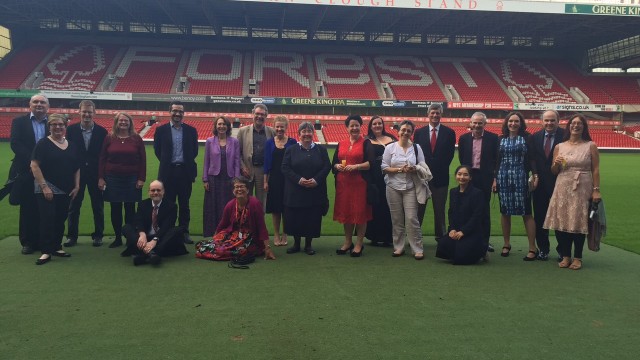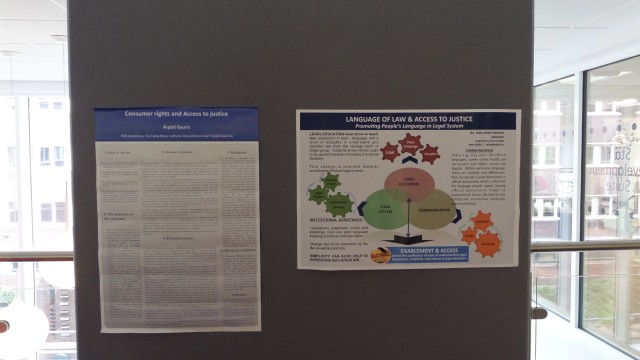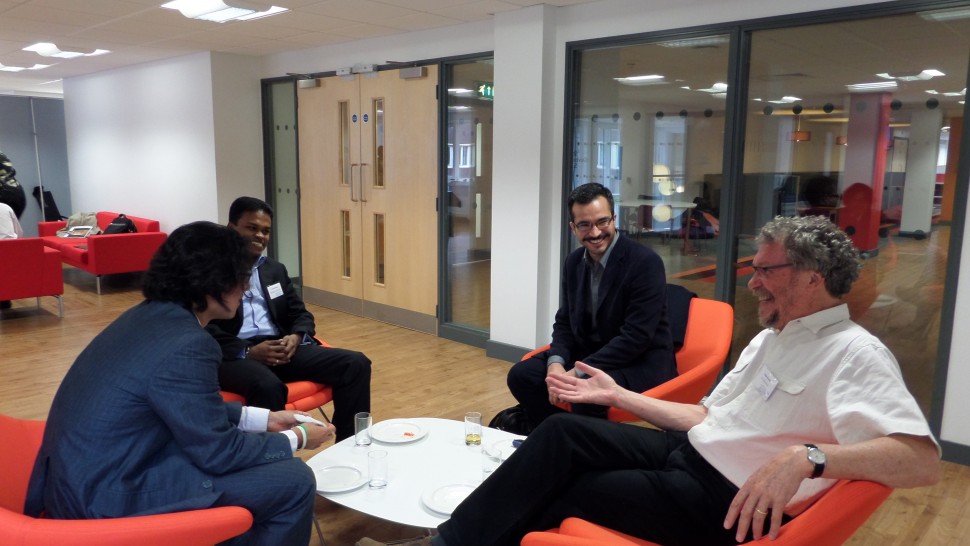We are delighted with the success of our second academic conference, informally known as CLE15 held on 19-21 June 2015. Focused around the concept of “access to justice”, participants were invited to be creative, and many were extremely innovative, including drama, interactive workshopping, and participation by videoconference from the other side of the globe. In addition, friendships and links were forged, in sessions and in more informal activities (which included a dinner at the ground of the world-famous Nottingham Forest soccer club).

Keynote sessions anchored and challenged the audience, including sessions by Amerdeep Somal, NLS alumna and last year’s Nottingham Trent University Alumna of the Year; Professor Janine Griffiths-Baker; Simao Paxi-Cato of Invictus Chambers and Young Legal Aid Lawyers and Professor Ron Staudt from Chicago on innovative ways in which US law students have worked to provide legal resources and templates for use by the public. Professor Pat Leighton of the Legal Education Research Network provided rousing closing comments encouraging participants to follow up their innovations and ideas by exposing them to rigorous research and critique.
Participants came from Australia, Canada, Chile, China, Fiji, Hungary, India, Ireland, New Zealand, Turkey, the UK and USA. Details of the conference recorded live as it unfolded can be found at paul.maharg.com and received in the region of 700 views.

Talha Abdul Rahman (Advocate, Supreme Court of India) Language of Law and Access to Justice; Árpád Gyuris (PhD candidate, Pázmány Péter Catholic University, Hungary) consumer rights and access to justice
Papers, posters and presentations were given by the following:
Deborah Ankor (Flinders University Australia): Developing holistic professional identity through clinical legal education 1 2
Jo Ann Boylan-Kemp and Pamela Henderson, (Nottingham Law School, UK): Developing oral skills in undergraduate stduents to enhance access to justice
Graeme Broadbent (Kingston Law School, UK): Do we need a professor for the public understanding of law?
Sameena Dalwai (Jindal Global Law School, India): Caste in Law Schools?
Kılınç Ayşe and Akkuş Ezgi Fulya (Afyon Kocatepe University Faculty of Law, Turkey): the role of legal clinics in access to justice in Turkish legal education
Jenny Gibbons (University of York Law School, UK): Ethics in action: Two problem-based learning workshop sessions demonstrating the innovative way legal education can be delivered to enhance student’s consideration of access to justice issues
Yves Goguen (Doctorate in Civil Law (Candidate), Faculty of Law, McGill University , Canada) The Role of Legal Education in the Professional Socialization Process: Whose Responsibility is Public Interest Training, Anyways?
Jane Harries (Director, TNA Training, UK): Training for All
Liz Heffernan (Trinity College Dublin, Ireland): Building a Foundation for Access to Justice: Unlocking the First Year Curriculum
John Hodgson (Nottingham Law School, UK): What is a solicitor?
Becky Huxley-Binns (University of Law, UK): “A threshold concept of undergraduate law and ethics?”
Jeffrey Kennedy (Doctorate in Civil Law (Candidate), Faculty of Law, McGill University, Canada): The View from Atop the Hill: Spatial Education, Transsystemia and ‘the Space Between’
Paul Maharg (Nottingham Law School, UK/ Australian National University, Australia): Well-being and learning: what legal educators and regulators can learn from progressive primary education.
David Ong (Nottingham Law School, UK): Integrating Access to Environmental Justice within the University Law School Curriculum in England
Jennifer E Spreng (Arizona Summit Law School, USA): Suppose the class began the day the case walked in the door 1 2
Ronald W Staudt (Chicago-Kent College of Law, USA): Access to Justice Technology and the Role of Legal Education 1 2
Lynn Su (New York Law School, USA): Access to Justice for Crime Victims, the Accused and the Community: Teaching Law Students about the Role of the Prosecutor in Advancing Social Justice

